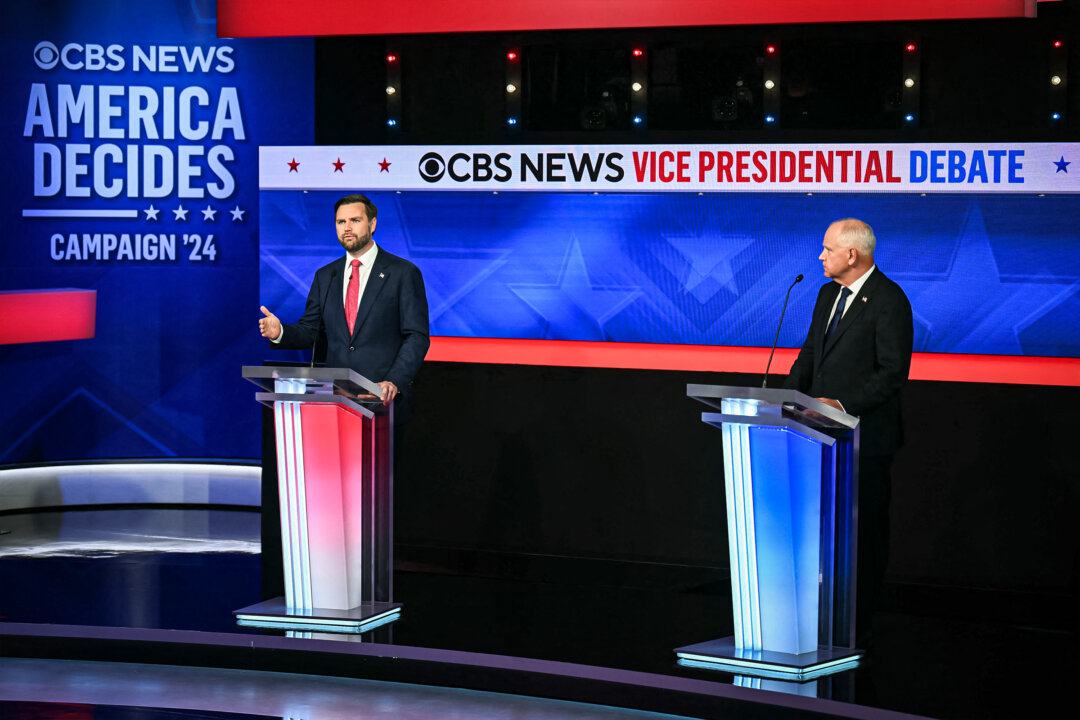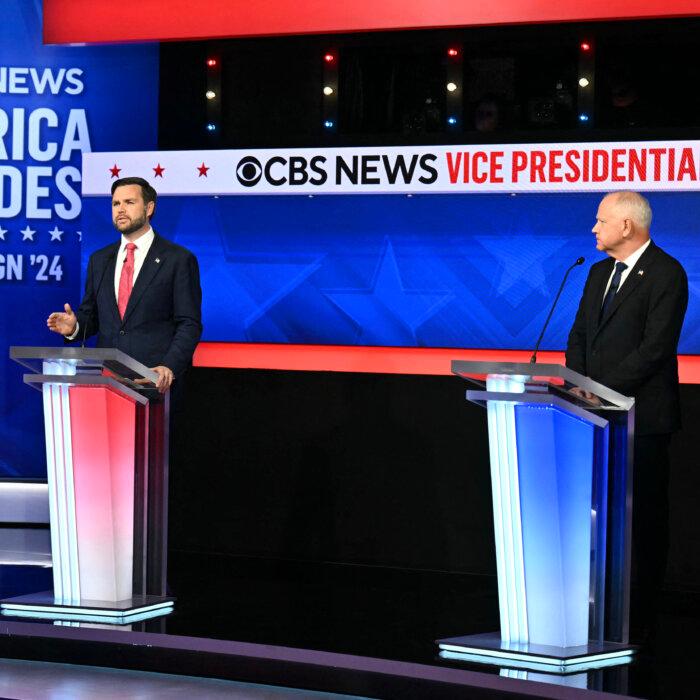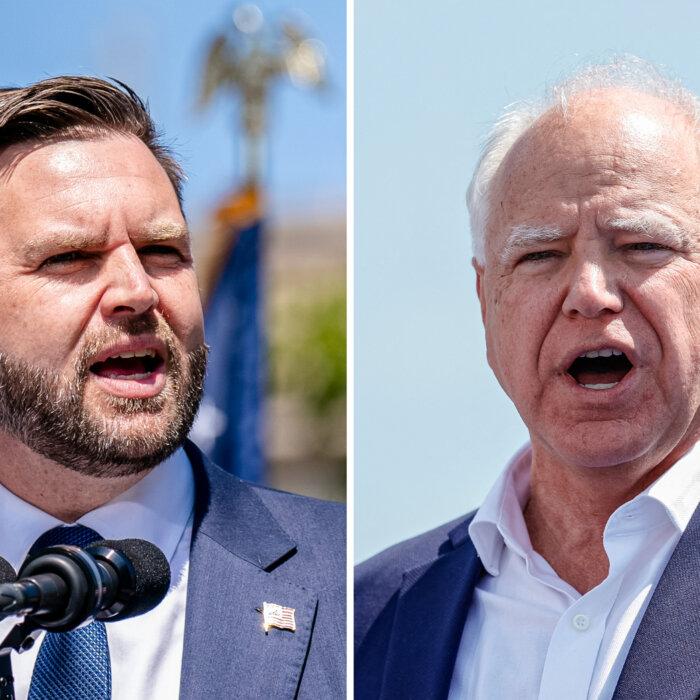Cordiality amidst clashes marked the first and only vice-presidential debate of 2024.
The Oct. 1 CBS News event hosted by Norah O’Donnell, of CBS Evening News, and Margaret Brennan, of Face the Nation, pitted Sen. JD Vance (R-Ohio) against Minnesota Gov. Tim Walz.
While both were plainspoken and civil, Vance provided a crisp defense of former President Donald Trump’s America First policies while Walz, in defending the policies of the administration co-helmed by his running mate, Vice President Kamala Harris, stumbled at times.
Vance’s dominant debate performance earned him rare praise from some liberal media outlets. A majority of columnist and contributors, nine out of thirteen, surveyed by The New York Times said Vance won the debate. A CNN post debate poll saw Vance as the winner of the debate by a 2 percent margin.
Here are highlights of a debate that revealed commonalities and differences between the two Midwesterners.
Vance Highlights Harris’s Record, Walz Defends It
“If Kamala Harris has such great plans for how to address middle class problems, then she ought to do them now,” Vance said in his closing remarks.
The senator brought up Harris’s record on a range of issues from immigration and the economy to America’s ongoing housing crisis. He blamed Harris for moving to free up several billion in Iranian assets before the events of Oct. 7 when Hamas terrorists attacked southern Israel.
“When did Iran and Hamas and their proxies attack Israel? It was during the administration of Kamala Harris,” Vance said.
Walz countered by claiming that Trump’s leadership had laid the groundwork for destabilization in the region.
“We need the steady leadership that Kamala Harris is providing,” he said.
Vance described a surge of immigrants in recent years as one of multiple factors increasing housing prices, pinning responsibility on Harris and her administration for relatively lower wages for domestic workers and other issues he tied to the border.
Walz responded in part by saying that the border crisis could have been addressed through the bipartisan bill advanced by Sen. Jim Lankford (R-Okla.) and others earlier this year, in line with arguments from Harris and other Democrats.

Vance also blamed Harris for what he called “censorship on an industrial scale,” describing government-coordinated suppression of information on social media and in other contexts as more perilous to democracy than Trump’s rhetoric on Jan. 6, 2021.
Walz in his response pivoted to talk of Jan. 6, the initial question that prompted Vance’s talk of censorship.
Vance also discussed Harris’s record on energy, saying the United States “has got to invest more” in nuclear power than it has under Biden-Harris.
Walz defended the administration’s energy policy, saying natural gas production was at record levels. That’s in line with figures from the U.S. Energy Information Administration. He did not mention nuclear energy.
Civility No Ordeal
Facing off on primetime television at a time of intense national polarization, the two Midwestern politicians from opposing parties remained, in true Midwestern fashion, nice.
Though they often clashed, both found points of agreement. “There was a lot of commonality here,” Walz said in his closing statement.
Vance helped set the tone with gracious gestures.
During a discussion of the devastation from Hurricane Helene, Vance suggested both men would be praying for the victims.
Vance also expressed sympathy for Walz when the governor said his 17-year-old had seen a shooting.
“Christ have mercy,” the senator said.
The agreement went beyond rhetoric to include some policy substance.

Amid a discussion of reshoring American manufacturing, Walz said, “much of what the senator said right there, I’m in agreement with him,” before saying the Schumer-Manchin bill championed by his ticket-mate drove manufacturing job growth.
In a discussion of housing prices, Walz said he and Vance could “find some common ground.”
Vance said some of his opponent’s statements, which focused on the commoditization of homes and Minnesota’s down payment financial assistance program, included some things he sees as “halfway decent” and others with which he disagrees.
He went on to specify that he agrees housing shouldn’t be seen as a commodity.
In a discussion of childcare shortages, Vance said his opponent was right to emphasize a lack of flexibility when it comes to funding providers, saying churches and some other models cannot always easily get support under the status quo.
“Unfortunately—look, we’re going to have to spend more money,” the senator added.
“I don’t think Senator Vance and I are that far apart. I’m not opposed to what he’s talking about on options,” Walz said.
CBS Cuts Mics as Vance Challenges Fact Check
At the beginning of the debate, Brennan said the debate would “provide the candidates with the opportunity to fact-check claims made by each other. CBS News reserves the right to mute microphones to maintain decorum.”
That policy came under pressure Tuesday night.
During an exchange on immigration, Walz raised Vance’s statements about Haitian migrants in Springfield, Ohio.
“The people that I’m most worried about in Springfield, Ohio, are the American citizens who have had their lives destroyed by Kamala Harris’s open border,” Vance replied.

Brennan later clarified, after Walz’s response, that “Springfield, Ohio does have a large number of Haitian migrants who have legal status, temporary protected.”
Earlier this year, the Biden-Harris administration extended temporary protected status to 300,000 Haitians who were illegally in the United States.
“The rules were that you guys weren’t going to fact-check, and since you’re fact-checking me, I think it’s important to say what’s actually going on,” Vance rebutted.
Both moderators talked over Vance and tried to move to the next question as Walz also chimed in. CBS eventually muted both candidates’ microphones as Vance gave an explanation of the asylum process that gave the migrants in Ohio legal status, contrasting it with the green card application process which immigrants are typically expected to comply with.
“Gentlemen, the audience can’t hear you because your mics are cut,” Brennan said before moving on to a question about the economy.

Home Prices
Even as they concurred on some issues, including aspects of the housing crisis, Vance and Walz ultimately disagreed on the root causes.
While saying it is not the sole reason for rocketing housing costs, Vance attributed the rise in part to Harris “letting in millions of illegal aliens into this country.”
“Twenty-five million illegal aliens competing with Americans for scarce homes is one of those most significant drivers of home prices in the country,” he said. “It’s why we have massive increases in home prices that have happened right alongside massive increases in illegal alien populations under Kamala Harris’s leadership.”
Vance touted Trump’s proposals to restore housing affordability by using federal lands, reducing red tape, offering tax breaks, and decreasing immigration.
But lowering energy prices is another strategy to lower home prices, Vance noted.
“If a truck driver is paying 40 percent more for diesel than the lumber he’s delivering to the job site to build the house is also going to become a lot more expensive,” Vance said. “If we open up American energy, you will get immediate pricing relief for American citizens.”

Walz disagreed that illegal immigration is one of the primary factors behind record home prices.
In recent Congressional testimony, a former Border Patrol chief for the Yuma Sector described the increase in crossings under the Biden administration compared to the Trump administration.
“There have been more than 10.5 million illegal entry encounters nationwide, with more than 8.5 million of those encounters at the southwest border since the beginning of [fiscal year] 2021. By comparison, CBP recorded around 3.1 million such encounters nationwide from [fiscal year] 2017-2020,” Chris Clem testified.
The Harris campaign has proposed building three million new affordable homes and rental units, facilitated through grants, tax credits, and red tape reduction. She wants to give first-time homebuyers $25,000 in down payment assistance.
Tough Questions on Past Statements
Both candidates faced questions about comments they made in the past.
Walz was asked about his claim that he was in Hong Kong when the June 4, 1989, Tiananmen Square massacre occurred. It was later found that Walz had arrived in China in August of that year, making it impossible for him to have been there then.

When pressed by moderators about the claim a second time, Walz said he misspoke.
He added that he was a “knucklehead” at times and “got caught up in the rhetoric” when he made the claim.
Vance was also asked about his past comments about Trump, including comments published by The Washington Post in which Vance was critical of Trump’s economic performance as president.
Vance did not deny the reported messages but blamed Congress for holding Trump’s agenda back, saying there “were a lot of things on the border, on tariffs.”
Trump “could have done so much more if the Republican Congress and the Democrats in Congress had been a little bit better about how they governed the country,” Vance said.
Speaking on other past comments critical of his running mate, Vance repeated his regret for the comments, saying, “I was wrong about Donald Trump.”
“Donald Trump delivered for the American people, rising wages, rising take-home pay, an economy that works for normal Americans, a secure southern border,” Vance said. “When you screw up, when you misspeak when you get something wrong, and you change your mind, you ought, to be honest with the American people.”



